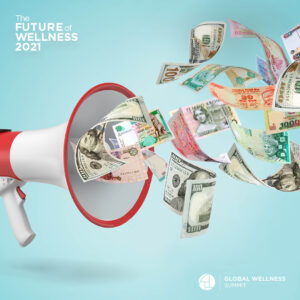
Trend #8
Money Out Loud
Financial wellness Is finding its voice
By Cecelia Girr & Skyler Hubler
Download Trend
Introduction
Money has topped the “do-not-discuss” list for decades—right alongside religion, sex and politics. Bringing up the “m” word on a first date has long been considered a surefire way to guarantee you won’t get a second one. And just a few years ago, publicly sharing your salary online would have landed you on HR’s naughty list.
But it’s 2021, and transparency is trending. A culture craving authenticity is now breaking the money taboo—transforming finance from a hush-hush, one-size-fits-all, cut-and-dry industry to one that’s more human, empathetic and, dare we say, fun. Financial therapists are tackling the intersection between money and mental health. Financial literacy courses are simplifying complicated finance bro jargon. And the three billion views of #personalfinance content on TikTok prove that finance influencers are officially a thing. As society gets candid about the role money plays in our lives, money talk is moving outside the bank.
Money & Mental Health
This growing openness is being driven by a much larger mental health awakening. We’re moving on from the vanities of look-good, feel-good wellness and lifting the lid off the heavier pressures that are contributing to an unhealthy society. Wellness is already sparking crucial conversations around therapy, sex and death. So, as the number one source of stress globally,1 it’s about time money is put under the microscope.
The reasons why it’s taken this long are complex, cultural and deeply rooted in history. In France, strict money silence is attributed to the country’s peasant heritage. Mossuz-Lavau, author of L’Argent et nous (Money and Us), notes that French farmers would hide their cash around the house, being careful not to talk about it so that it wouldn’t get stolen. This led to a superstition that the less you talked about money, the more likely you would be to keep it.2 Then there’s religion. While financial teachings differ from faith to faith, nearly all caution their followers to tread carefully. The Bible, for example, famously teaches that “the love of money is the root of all evil” and encourages readers to give alms secretly. In more modern times, widening inequality also plays a role. While interviewing wealthy New Yorkers for her book Uneasy Street: The Anxieties of Affluence, Rachel Sherman discovered that high-earners tend to keep quiet about their income out of guilt. But while the intentions of stealth wealth may be pure, privacy only makes matters worse. And lastly, there are cultural norms. From South America to Southeast Asia, children are taught from a young age that discussing money is a major no-no. By the time you reach adulthood, you know better than to ever inquire about net worth, reveal your retirement savings (or lack thereof), or admit to how much you spent during your last online shopping splurge.

But just as jogging was once considered strange, the road to better financial wellbeing begins with a mindset shift. BlackRock points out that before the 1960s, running wasn’t correlated with health. “But then Nike made the connection. They turned something that was feared and doubted into something that is part of the overall picture of our wellbeing.”3 Today, you can’t walk on the city streets without a runner breezing past you. In the same vein, society is finally waking up to the link between money and mental health.
The silence around money isn’t making us well. In fact, it’s making us sick. One report from Thriving Wallet found that financial stress affects physical health, blood pressure, respiratory symptoms, somatic issues and rates of tension.4 Another from the UK Money and Mental Health Institute found that people with anxiety and depression were three times more likely to be in debt.5 But if you think the answer is as simple as being debt-free, think again. Bank of America Corp. surveyed people who have enough investable money to qualify as “mass affluent” and found that financial concerns negatively affect the mental health of 59% of respondents, while 56% said their physical health had been harmed.6 And those findings we’re pre-pandemic. As you can imagine, sweeping unemployment and worldwide economic shutdowns haven’t exactly brought sunshine and rainbows. One positive to come out of the crisis, however, is the realization that things need to change.
That’s where financial wellness—not to be confused with financial health—comes in. Financial health is about how much money you have and what you plan to do with it. And while it’s a perfectly logical way to gauge the health of one’s finances, it gives no consideration to the health of the individual. Financial wellness, on the other hand, explores our relationship with money and unearths the deeper issues that are negatively affecting that relationship. Financial wellness is shifting the conversation from the what to the why, from the purely pragmatic to the psychological. And it’s moving into the mainstream. HSBC, one of the world’s largest banking and financial services institutions, expanded their financial wellness offerings at the start of the pandemic. PwC points to financial wellness as a solution to boosting employee productivity while lowering medical costs. And fintech start-ups like Happy Money—which evaluates “happy” and “sad” spending patterns—are banking on financial wellness as the way forward.
It’s true that all the green juices, nap pods and personal training sessions in the world won’t make you well if you’re buried by financial anxiety. So, while finance brands are rightfully pushing for healthier money habits, they can’t work alone. True progress will require a 360-degree approach, one that frames financial wellbeing as a crucial piece of the overall $4.5 trillion dollar wellness puzzle.7 Up until now, employers have largely been leading the charge. In the UK, major businesses are introducing platforms that champion all-around lifestyle improvements. Tesco, for instance, is a partner of Gympass Wellness, which offers “mind and body solutions including mental health, tailored nutrition plans, mindfulness, meditation, sleep and relaxation programs plus financial wellbeing advice.”8 We’re also seeing the world’s leading fitness membership company, Classpass, promote financial wellness under the wider corporate wellness umbrella.
Beyond traditional wellness programs, something even more fascinating is beginning to take place. New players are framing money stress not as a finance problem but as a health problem. ZavFit is one emerging player representing this paradigm shift. The European HealthTech start-up has built “the first health tool for money that focuses on improving the health and happiness of the individual as an outcome.” ZavFit’s founder and CEO, Anna Freeman, is on a mission to spark a global Money Fitness movement. According to Freeman, “Being ‘money fit’ isn’t about how much money you have. It’s about how you use the money that you do have. Are you spending it on the things that make you healthy and happy?” To help answer that question, ZavFit includes a Money Moods feature that lets you reflect on the emotional impact of your spending.
Breaking the Silence
The growing financial wellness movement is bringing money talk out of the shadows. For proof, look no further than pop culture. Online platforms like Refinery29’s Money Diaries—which give a dollar-by-dollar account of how real people spend over the course of a week—are breaking the ice by framing financial habits (both good and not-so-good) in the context of daily life. Money matters have also made their way to the Instagram stage, where over 1.2 million #debtfreecommunity posts offer practical, peer-to-peer advice for overcoming debt. And the conversation is just getting started.
As younger generations navigate a shaky financial future, they’re looking to new personalities and new platforms for answers. Haley Sacks—better known as Mrs. Dow Jones—is blending her money smarts with her love of pop culture to make finance less intimidating. During the pandemic, she offered a free seven-week digital learning program covering everything from “WTF is a stimulus package” to how to deal with unemployment. With a “Fortune 40 Under 40” accolade under her belt, the quirky finance guru is setting out to make “keeping up with the Dow Joneses as fun as Keeping Up With the Kardashians.”
 Virtual escapes are also beginning to mirror our financial realities—giving financial literacy a gamified spin. In Nintendo’s wildly popular Animal Crossing: New Horizons video game, players learn to manage long-term debt, build a budget, and trade on the “stalk market.” In April 2020, the game’s Bank of Nook slashed interest rates from 0.5% to .05%—a move that reflected real life as “central banks ease lending conditions to combat the coronavirus and its economic fallout,” according to Markets Insider.9
Virtual escapes are also beginning to mirror our financial realities—giving financial literacy a gamified spin. In Nintendo’s wildly popular Animal Crossing: New Horizons video game, players learn to manage long-term debt, build a budget, and trade on the “stalk market.” In April 2020, the game’s Bank of Nook slashed interest rates from 0.5% to .05%—a move that reflected real life as “central banks ease lending conditions to combat the coronavirus and its economic fallout,” according to Markets Insider.9
While social media and video games are effectively demystifying money in a public way, some discussions require a more personal approach. “Because our relationship with money is heavily emotional and psychological, financial therapy takes a look at the way money shows up holistically in a person’s life,” says Lindsay Bryan-Podvin, a financial therapist and author of The Financial Anxiety Solution. When you’re talking about money, you’re talking about so much more—the past, the future, pressure, shame, trauma, status. Financial therapists help people unpack those subconscious hurdles so they can better spend, save and invest in alignment with their values. “For example, if you value sustainability and community, you’d be better off spending money at a farmer’s market and local grocery store than at a big box grocery conglomerate,” explains Bryan-Podvin. Thanks to a much broader mental health movement, this relatively new world of financial therapy is gaining global momentum. The Financial Therapy Association now has over 300 international members and counting.10 In London, financial therapy app Emma recently secured €2.23 million in seed funding.11 And around the world, financial planners and advisors are beginning to look beyond the numbers and adopt a more empathetic approach. Though financial therapists currently operate independently from traditional banks, that may not be the case for long. As the world transitions to digital payments and online banks turn brick-and-mortar establishments into a relic of the past, financial therapy might just give us a new reason to stop by our local branch. After all, AI hasn’t proven to be the best listener.
Financial Wellness For All
The money conversation is heating up, and it’s being brought to the fore by those who have typically been excluded from dialogue altogether. We all engage with money daily, yet our experience with it vastly differs based on factors like race, socioeconomic status, age, personal values and even sexual orientation. And though the majority of 2020 headlines felt hopeless, the year did bring promising signs of greater financial inclusivity.
 In February 2020, native Swede Magnus Larsson launched Majority—a banking service that sets immigrants up with tools needed for financial success. In August, Islamic financial services company Manzil teamed up with KOHO—Canada’s leading challenger bank—to offer a Halal Prepaid Visa card geared toward Muslims and ethically-conscious consumers. In September, over 50,000 people joined the waitlist for Jefa—a digital bank specifically designed for women in Latin America. In October, rapper Michael “Killer Mike” Render launched Greenwood, a neobank working to ensure communities of color can accrue wealth and combat systematic oppression. In the same month, Southeast Asia-based Razer Fintech became one step closer to establishing the world’s first global youth bank with the launch of the Razer card. And most recently, in November 2020, Daylight became the first LGBTQ+ digital bank in the US. Daylight members will have access to financial coaches who specialize in LGBTQ+ pain points, such as starting a family or buying a home—as same-sex borrowers are 73% more likely to be denied a mortgage.12 New disruptors are building a future where financial access is a basic human right. And in their future, there’s no room for soulless entities.
In February 2020, native Swede Magnus Larsson launched Majority—a banking service that sets immigrants up with tools needed for financial success. In August, Islamic financial services company Manzil teamed up with KOHO—Canada’s leading challenger bank—to offer a Halal Prepaid Visa card geared toward Muslims and ethically-conscious consumers. In September, over 50,000 people joined the waitlist for Jefa—a digital bank specifically designed for women in Latin America. In October, rapper Michael “Killer Mike” Render launched Greenwood, a neobank working to ensure communities of color can accrue wealth and combat systematic oppression. In the same month, Southeast Asia-based Razer Fintech became one step closer to establishing the world’s first global youth bank with the launch of the Razer card. And most recently, in November 2020, Daylight became the first LGBTQ+ digital bank in the US. Daylight members will have access to financial coaches who specialize in LGBTQ+ pain points, such as starting a family or buying a home—as same-sex borrowers are 73% more likely to be denied a mortgage.12 New disruptors are building a future where financial access is a basic human right. And in their future, there’s no room for soulless entities.
Let’s Get Loud
All positive progress starts with a conversation. In this case, the conversation is about money—how it makes us feel, how and why our experiences with it differ, and what ultimately needs to change. As the conversation becomes increasingly loud, inclusive and honest, the old voices will be shouted out by the new. We’ll begin to see the end of financial systems designed to profit from our failure and the start of financial wellness awakening. Money talks. It’s time we start using a language everyone can understand.
Endnotes
1 “Money is the biggest cause of stress in the world,” Huffington Post, November 25, 2015.
2 Charlie Vandekerkhove, “In France, talking about money is more taboo than talking about sex,” Quartz, May 25, 2016.
3 Frank Cooper, “Money talks, stress walks,” BlackRock, April 16, 2019.
4 “Thriving Wallet Research Insights Report,” Discover and Thrive Global, January 29, 2020.
5 “Money and Mental Health: The Facts,” Money and Mental Health Policy Institute, 2019.
6 Lananh Nguyen, “Wealthy Americans Say Financial Worries Hurt Their Mental Health,” Bloomberg, June 14, 2019.
7 “Wellness Industry Statistics and Facts,” Global Wellness Institute, 2018.
8 “Employers embracing Gympass’ online mental, physical and financial wellness solution,” Employee Benefits, May 7, 2020.
9 Ben Winck, “Nintendo cuts ‘Animal Crossing: New Horizons’ interest rates to boost virtual spending,” Business Insider, April 24, 2020.
10 Leslie Albrecht, “Why the best person to give you money advice may NOT be an accountant or financial adviser,” MarketWatch, September 30, 2019.
11 “London-based personal finance management app Emma that provides financial therapy to users gets €2.23M funding,” Silicon Canals, March 6, 2020.
12 Hua Sun and Lei Gao, “Lending practices to same-sex borrowers,” PNAS, April 16, 2019.
Download this 2021 trend and receive the 2021 mid-year update as well. The 2022 Future of Wellness global trends report is now available. View the latest trends. Subscribe to our mailing list and receive the bi-weekly TRENDium, a compendium of the trends impacting the multi-trillion dollar global wellness economy featuring the latest news and insights. Sign-up to receive the TRENDium.